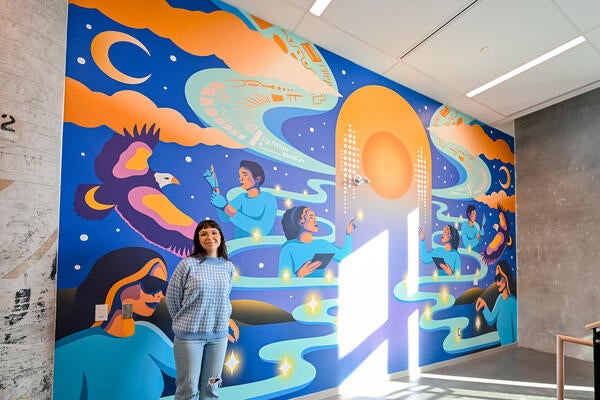Accelerator Centre helps high-tech firms soar higher, sooner
The Accelerator Centre, located in the David Johnston Research and Technology Park, has a simple mission: help high-tech firms with world-class potential succeed sooner
The Accelerator Centre, located in the David Johnston Research and Technology Park, has a simple mission: help high-tech firms with world-class potential succeed sooner
By Dave Pink Communications & Public Affairs The mission at Waterloo’s Accelerator Centre is really quite simple: take in high-tech companies with the potential to become world class, nurture and mentor them, then watch them fly away.
The mission at Waterloo’s Accelerator Centre is really quite simple: take in high-tech companies with the potential to become world class, nurture and mentor them, then watch them fly away.
“The businesses we accept into the Accelerator Program are already off the ground. What we do here is get them up to full throttle so they can soar into the clouds,” says Tim Ellis, the Accelerator Centre’s CEO.
The Accelerator Centre opened for business in the David Johnston Research and Technology Park on the University of Waterloo’s north campus in May 2006, a unique experiment intended to channel and assist the technical innovators and entrepreneurs who thrive in the region. The University of Waterloo has stood solidly behind the Centre since opening day, and is represented on the board of directors, along with Wilfrid Laurier University, Conestoga College and the University of Guelph.
In all, about 90 tech companies have called the Centre home, if only for a short while. Typically, a company will remain in the Accelerator Program for 18 to 36 months. Some graduate, and achieve global success. Others, although they may be profitable, don’t attain those high expectations.
“If they’re not growing, then they exit the program,” says Ellis. That space will be allocated to a start-up with greater potential. The decision — who stays, who goes, and who gets in — is determined by proprietary processes that are managed by Ellis and his team.
“The Accelerator Centre is not about office space,” Ellis says. “We don’t want people who are here just to fill that space. We’re looking for great people with great ideas who have the potential to develop a company that can sell across the world.”
Currently, there are 28 companies in the Accelerator Centre, with a total 175 employees. Client occupancy and service fees cover about 30 percent of the Centre’s expenses, while the remainder is financially funded from various government agencies.
A six-year track record of success now has others looking to copy the Accelerator Program model. In Ontario, the cities of Stratford and Barrie are investigating similar initiatives, and Australia’s University of Wollongong has consulted with the Waterloo Accelerator Centre as it plans a similar venture in that country.

Read more
How Doug Kavanagh’s software engineering degree laid the foundation for a thriving career in patient care

Read more
Upside Robotics secures new funding to accelerate the future of sustainable farming

Read more
Many Hearts, One Mind by Indigenous artist Alanah Jewell celebrates the act of creation shared by the Land and innovators in our community
The University of Waterloo acknowledges that much of our work takes place on the traditional territory of the Neutral, Anishinaabeg, and Haudenosaunee peoples. Our main campus is situated on the Haldimand Tract, the land granted to the Six Nations that includes six miles on each side of the Grand River. Our active work toward reconciliation takes place across our campuses through research, learning, teaching, and community building, and is co-ordinated within the Office of Indigenous Relations.